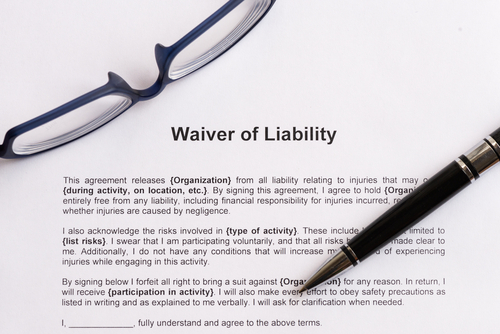- Home
- Firm overview
- Personal injury
- Mass torts
- Testimonials
- Articles
- Blog
- Contact
Menu
What Happens If You Sign A Liability Waiver

What Happens If You Sign A Liability Waiver
- Salter Ferguson, LLC
- Personal Injury

People unwittingly agree to and sign legal documents on a daily basis. Terms of service for having a social network, installing new apps. Signing liability waivers in order to participate in certain events is no different. Many companies and resorts use liability waivers in order to make their patrons aware that there are risks associated with the event they will participate in. On that same token, the waiver acts to absolve the company of any responsibility for injuries or accidents that occur. But liability waivers are often not as concrete as they seem.
Personal Injury And Liability Waivers
People who have been injured at an event, venue or activity that required a liability waiver often feel that they have no case because they believe they’ve signed away all their rights. These waivers are commonly found in the following activities and events where personal injury accidents are more likely to occur:
- Extreme sports events
- Amusement parks
- Ski resorts
- Tours
- Boat rental
- Vehicle / equipment rental
- Indoor / outdoor skydiving
How A Liability Waiver Holds Up
While liability waivers are written to absolve the hosts of any wrongdoing, how well or even how valid the waiver is can depend on various factors. Injured parties may still have a case under certain circumstances such as:
- Writing of the Waiver
A liability waiver should be written properly so as to cover the party that is distributing it. If the language of the waiver is unclear, ambiguous, or poorly written (loopholes), an injured party may still be able to sue.
- Clarity of the Waiver
The party distributing the waiver has the responsibility of making the signee clearly aware of what they are signing. Critical information should be prominently displayed on the waiver. If the waiver is multiple pages long or has the most crucial language hidden deep in the document, the injured person may be able to sue.
- How the Accident Occurred
Waivers are written to cover certain risks associated with the activity at hand. They are not written to cover gross negligence, accidents caused on purpose, and other acts that cannot be waived. Even when signing a liability waiver, there is a standard of care that is expected. Waivers are not a cover-all.
When you sign a liability waiver and are injured, it is important to know that you have not necessarily signed away all of your rights. If you or a loved one has been injured in an accident due to someone else’s negligence and you signed a liability waiver, contact Salter Ferguson today to schedule a consultation. You may be able to collect compensation for pain, medical expenses and other damages associated with your injury.
The articles on this blog are for informative purposes only and are no substitute for legal advice or an attorney/client relationship. If you are seeking legal advice, please contact our law firm directly.